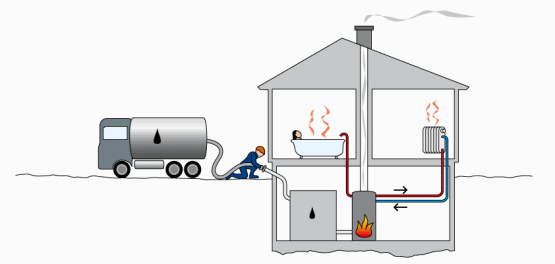Oil
In Sweden, the use of oil for heating in domestic premises is decreasing. Oil is a fossil fuel that causes environmentally harmful emissions when burned. The availability of oil in the future is uncertain, both due to the instability in oil-producing regions and due to the dwindling oil reserves.
Oil became a major energy source after the Second World War and dominated the heating of single-family houses during the 1950s, 1960s and 1970s. Developments were changed radically by the oil crises in the 1970s, and electric heating was then installed instead in most newly built houses. Today, around 9 percent of single-family houses in Sweden are heated mainly by oil.
A fossil fuel
The world’s reserves of oil have been formed from parts of plants and animals over many hundreds of millions of years. New oil reserves are being found, but the oil will come to an end sooner or later. As the most easily available oil reserves come to an end, it will become more difficult and more expensive to recover new oil. A scenario is that the oil will become too expensive to burn and other energy sources and improved conservation will gradually have to replace oil as a fuel for heating our dwellings.
Environmental impact
When oil burns, energy is liberated as heat. At the same time, the oil is converted to many other substances that are discharged to atmosphere with the flue gases. Sulphur and nitrogen compounds are formed in combustion, and these are harmful to the environment. Carbon dioxide is the end product of complete combustion and cannot be removed. Carbon dioxide affects the climate and is generally considered to be one of the world’s most serious environmental problems.

The oil-fired boiler heats both the hot water for the house and the water in the central heating system. The oil is delivered to the house by a tanker through a filler pipe in the wall of the building. Illustration: Bo Reinerdahl
Modern oil firing
It is relatively convenient to heat your home with oil, since it requires little work input but it is expensive. A modern oil-fired boiler utilizes and converts 80–85 percent of the energy in the raw material to usable heat. In the worst case, the efficiency of an old boiler may be below 50 percent.
The operation of the boiler and the boiler convection - the transfer of heat in the flue gases to the boiler water – are important elements. If a boiler is to retain its efficiency, it is important for it to be cleaned of soot and to have an annual service during which the combustion efficiency is measured. A modern oil burner has a combustion efficiency of up to 98 percent.
Advantages and disadvantages
+ simple to convert due to the system being water-based
+ low work input
- uncertain price in the future
- is a fossil fuel, i.e. not renewable
- environmentally harmful emissions.


